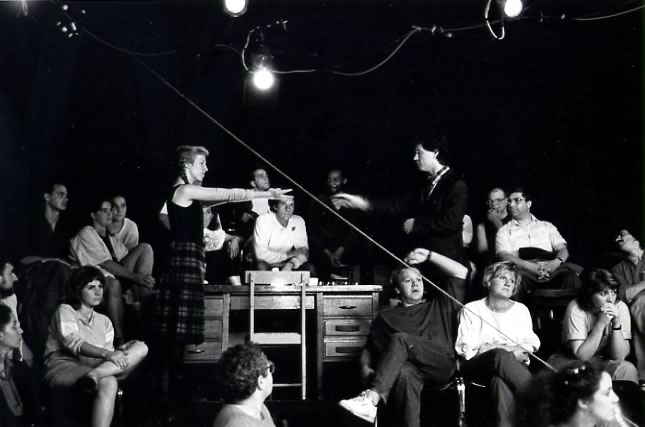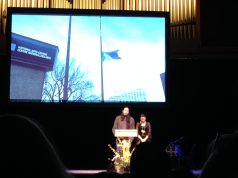
Nothing, with the exception of recounting last night’s dreams, is more boring than nostalgia. Nothing distorts history like nostalgia. And nothing hobbles an argument like an appeal to nostalgia. Nonetheless.
I’ll restrict myself to the scene I came up in: Toronto theatre in the late 1980’s and early 90’s. Hillar Liitoja and Sky Gilbert were the avant-garde, Theatre Columbus and Smith Gilmour and Crow’s and Necessary Angel comprised the seat of small theatre, Passe Muraille and Factory and Tarragon were the bigger small theatre, Marlene Smith and Mirvish and Drabinsky operated outside public funding.
That’s a reductive list, I can hear you shouting, but for the purpose of the argument I want to make, it’ll do. It describes a reasonably healthy ecology, created by a few decades of steady arts funding, the audience numbers ascending (sometimes spasmodically, but in the main, ascending). Were there rivalries? Sure. Resentments? Of course. Writers and actors and audience sometimes felt excluded by the gatekeepers at each institution.
This spurred discussion, or, sometimes, the shaky creation of new, barely tenable institutions. There was never enough money. Passe Muraille always seemed to be a day or two from evaporation. So did Factory. So did we all: only a few could make a living doing the single thing they wanted to do. The rest of us hyphenated our professional identities and became actor-writers, actor-directors, writer-chef-caterwaiters.
There was never enough money. Equity fought to get actors more of it, while trying to support the delicate ecology. New plays were created by places that really couldn’t afford their new play development programs. Buildings mouldered. There was never enough money.
This was the eighties, which gave way to the nineties, which spawned Mike Harris and Reform. Reagan and Thatcher made it here, finally. Our smugness evaporated. And in the arts, the money dried up.
It started with a public discussion about who should fund art. About what a government’s role in the development of an art form should be. It was part of a larger conversation about shared values, about what society is for, about other voices taking space from the voices that had been dominant for so long. It was the Common Sense Revolution, it was Reform, it was “what, if anything, did we miss out on by Reagan and Thatcher taking so long to arrive?”
And the money, already inadequate, dried up. We fought. In the Toronto theatre we fought for art’s usefulness, and the fight went to Ottawa and across the country. And we lost the fight. It seems harsh to say we lost, especially since there are those who continue to make the arguments, especially since the OAC and the Canada Council and the TAC still exist, but what we lost was this:
Culture, it was decided, is not central to this society. It’s of use, it connotes a degree of civilization, but it’s not central. Culture is great, but it’s not worthy of a place in our collective life like, say, the economy is. The economy, so easy to measure and parse and fight over and politicize, dominates our discussions about society, about what we mean to each other.
So the money dried up, and eventually most of us stopped making the arguments about culture’s centrality to a society. Those arguments became sort of embarrassing. So we stopped fighting for our art and what happened was: we started to fight with each other.
The earliest fights of this new era were over the economics of art: could we as artists, use the tools of the dominant discourse to make ourselves somehow valid again? Would casting art’s value to a city in monetary terms lend us credibility? Arts organizations began making economic arguments to funders. Funders began to expect these justifications from artists. And some artists hated this line of argument, made no secret of hating it, and divisions emerged between those who believed in making that pitch and those who felt it cheapened the art.
Businesspeople were invited to join arts boards, fundraising in the private sector became a large part of a theatre’s job, and some people hated this and some people were grimly pragmatic about it. When the Stratford Festival announced proudly that less than 5% of its revenue came from public sources, some thought that was enviable, and some thought it a travesty. Stratford became either an innovative institution or a sellout shitshow, and which side of that you came down on said a lot about you.
We started to fight with each other because the original fight was lost. Suddenly Equity, always sort of hapless, became a locus of our discontent. How dare they stand between me and my art? If I choose to forego a meaningful price for my art, who are they to intervene?
And how is it that a segment of the form that interests me not at all, that I consider empty, how is it that Luminato (for example) has access to public money I can’t even begin to dream of?
And why won’t that older generation of artists finally release their grip on these mouldy institutions? How can we be expected to grow my art when nobody my age is a gatekeeper? How can we wrest power from the gerontocracy?
And how come airquotes established artists abuse the very notion of The Fringe by taking up slots that should go to airquotes legitimate fringe artists?
And when will midsized theatres, providing a constant, thin gruel of empty entertainments, take responsibility for destroying audiences?
And why do millennial artists insist on maligning what exists in the Toronto theatre, instead of building it?
And how could a man’s legacy possibly mean as much as the survival of the theatre he created? Created and saved?
And why can’t critics recognize they don’t mediate our experience in the way they once did? Conversely, why would a theatre presume to exclude critical appraisal, so useful for box office and as a catalyst for feedback, from the birth of a play?
Why is everyone so hostile? There was a time when we hated each other, laughed at each other up our sleeves, swiveled our heads in bars before eagerly bitching about each other’s work, resented the fuck out of each other’s successes. But, and here comes the nostalgia, we were all in it together.
We lost the fight, and now we fight each other.
I’m willing to take my share of the responsibility for losing that fight. The revolution that theatre makers of the 60’s and 70’s made seem so real and available shuddered and stopped around the time I was hitting my stride. Why didn’t I do more to leverage the Drawer Boy’s success toward insisting on art’s centrality in our society? That play was an argument for the tangible usefulness of art, but I didn’t spend much time at all amplifying its themes beyond the theatre; I happily preached to the already converted.
The best argument was a good play, we told ourselves. The fight was over, and we lost, and it’s now embarrassing to compare ourselves to places where art is central, so let’s get on with what’s possible here. Let’s do what we can, compete with our peers for what’s left of the public money, and call out those peers when the competition is imbalanced in any way.
So look. We can either have the dozens of fights among ourselves that will insure our insularity. And we will survive, and change in small ways, and some ideas will become paramount and some will fall away and we will in no way move beyond the bounds within which we currently exist.
Or we can decide to have the fight all over again. Decide to insist that art take its place at the centre. My ears are actually getting hot with embarrassment as I type that.
Decide that Paul Thompson’s and Ken Gass’s revolution was just on pause, and stop fighting with each other over knucklehead stuff, and together make this place electric.









